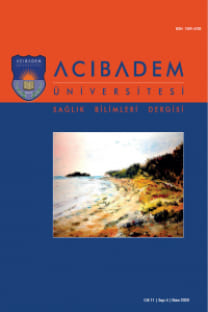Kanser Tanılı Hastanın Merley Mishel’in Hastalıkta Belirsizlik Kuramına Göre Hemşirelik Bakımı
Nursing Care of Patient With Cancer Diagnosis According To Merle Mishel"s Theory of Uncertainty In Illness: a Case Report
___
Özçelik H, Fadıloğlu Ç, Karabulut B, Uyar M, Elbi H, Eyigör S, et al. Kanser Hastasının Palyatif Bakımında Vaka Yönetimine Dayalı Multidispliner Bakım Protokolü. Ağrı Derg 2014;26:47–56. [CrossRef]Sepşlveda C, Marlin A, Yoshida T, Ullrich A. Palliative Care: The World Health Organization’s Global Perspective. J Pain Symptom Manage 2002;24:91–6. [CrossRef]
Dünya Sağlık Örgütü (WHO) . WHO Definition of Palliative Care. http://www.who.int/cancer/palliative/definition/en/
Karabacak Ü, Acaroğlu R. Konfor Kuramı. Maltepe Üniversitesi Bilim ve Sanat Derg 2011;4:197–202.
Bailey DE, Stewart JL. Uncertainty in illness theory. In: Alligood MR, Tomey AM, editors. Nursing Theorist and Their Work. New York: Mosby-Elsevier; 2010. pp.599–617.
Mishel MH. Uncertainty in illness. Image J Nurs Sch 1988;20:225–32. [CrossRef]
Barron CR. Stress, Uncertainty, and Health. In: Rice VH, editor. Handbook of Stress, Coping, and Health: Implications for Nursing Research, Theory, and practice. Thousand Oaks, CA: Sage Publications; 2000. pp.517–39.
Neville KL. Uncertainty in illness: an integrative review. Orthop Nurs 2003;22:206–14. [CrossRef]
Mishel MH. Reconceptualization of the Uncertainty in Illness Theory. Image J Nurs Sch 1990;22:256–62. [CrossRef]
Braden CJ. A test of the self-help model: learned response to chronic illness experience. Nurs Res 1990;39:42–7. [CrossRef]
Regan-Kubinski MJ, Sharts-Hopko N. Illness cognition of HIV- infected mothers. Issues Ment Health Nurs 1995;16:327–44. [CrossRef]
Lee YL, Gau BS, Hsu WM, Chang HH. A model linking uncertainly, post-traumatic stress and health behaviors in childhood cancer survivors. Oncol Nurs Forum 2009;36:E20–30. [CrossRef]
Lien C, Chen S, Tsai P, Chen K, Hsieh Y, Liang Y. Effectiveness of nursing instruction in reducing uncertainty, anxiety and self-care in breast cancer women undergoing initial chemotherapy. Hu Li Za Zhi 2010;57:51–60.
Sammarco A, Konecny LM. Quality of life, social support, and uncertainty among latina and caucasian breast cancer survivors: a comparative study. Oncol Nurs Forum 2010;37:93–9. [CrossRef]
Kazer MW, Bailey DE, Sanda M, Colberg J, Kelly WK. An internet intervention for management of uncertainty during active surveillance for prostate cancer. Oncol Nurs Forum 2011;38;561–8. [CrossRef]
Lien CY, Lin HR, Kuo IT, Chen ML. Perceived uncertainty, social support and psychological adjustment in older patients with cancer being treated with surgery. J Clin Nurs 2009;18:2311–9. [CrossRef]
Clayton MF, Mishel MH, Belyea M. Testing a model of symptoms, communication, uncertainty, and well-being, in older breast cancer survivors. Res Nurs Health 2006;29:18–39. [CrossRef]
Bailey D, Barroso J, Muir A, Sloane R, Richmond J, McHutchison J, et al. Patients with chronic hepatitis C undergoing watchful waiting: Exploring trajectories of illness uncertainly and fatigue. Res Nurs Health 2010;33:465–73. [CrossRef]
Tluczek A, McKechnie AC, Lynam PA. Modified uncertainty theory and parents’ perspectives about equivocal diagnostic results for cystic fibrosis. Qual Health Res 2010;20:209–23. [CrossRef]
Anema C, Johnson M, Zeller JM, Fogg L, Zetterlund J. Spiritual well- being in individuals with fibromyalgia syndrome: relationships with symptom pattern variability, uncertainty, and psychosocial adaptation. Res Theory Nurs Pract 2009;23:8–22. [CrossRef]
Reich JW, Johnson LM, Zautra AJ, Davis MC. Uncertainty of illness relationships with mental health and coping processes in fibromyalgia patients. J Behav Med 2006;29:307–16. [CrossRef]
Landis BJ. Uncertainty, spiritual well-being, and psychosocial adjustment to chronic illness. Issues Ment Health Nurs 1996;17:217– 31. [CrossRef]
Sanders-Dewey NEJ, Mullins LL, Chaney JM. Coping style, perceived uncertainty in illness, and distress in individuals with Parkinson’s disease and their caregivers. Rehabil Psychology 2001;46:363–81. [CrossRef]
Mishel M. Uncertainty of Illness. https://sites.google.com/a/ northgeorgia.edu/merle-mishel-middle-range-nursing-theorist/ home/uncertainty-of-illness
Mishel M, Sorenson D. Uncertainty in Gynecological Cancer: A Test of the Mediating Functions of Mastery and Coping. Nurs Res 1991;40:167–71. [CrossRef]
Holland JC, Andersen B, Breitbart WS, Compas B, Dudley MM, Fleishman S, et al. NCCN Distress Management, Clinical Practice Guidelines in Oncology. J NCCN 2010;8:448–85. http://www. aftercancer.co/wp-content/uploads/2015/11/NCCN-Distress- management-guidelines.pdf
NCCN. Distress Management for Patients. Version 1.2017.https:// www.nccn.org/patients/guidelines/content/PDF/distress-patient. pdf
- ISSN: 1309-470X
- Yayın Aralığı: 4
- Başlangıç: 2010
- Yayıncı: ACIBADEM MEHMET ALİ AYDINLAR ÜNİVERSİTESİ
Yatılı Bölge Lisesi Kız Öğrencilerinin Kansere İlişkin Bilgileri ve Kanserden Korunma Davranışları
Mine BEKAR, Funda EVCİLİ, İlknur BİLGİN
Fatmanur TEKİN, Meltem KÜRTÜNCÜ
SAĞLIK ÇALIŞANLARINA YÖNELIK ŞIDDETIN NEDENLERININ BELIRLENMESINE İLIŞKIN BIR ARAŞTIRMA
Adana Acıbadem Hastanesinde Hastane Enfeksiyonları Surveyansı: Bir Yıllık Analiz Sonuçları
Barbaros Şahin KARAGUN, Özay AKYILDIZ, Hilal ONAÇ, Fadime KAYA, Filiz ERDEMLER, Taylan Özğür ÇETİN, Bülent ANTMEN, Bülent SOYUPAK, Emre ALHAN
MIGREN KLINIK ÖZELLIKLERININ NÖTROFIL-LENFOSIT ORANI ILE İLIŞKISI
Fatma ŞİMSEK, Nuray BİLGE, Mustafa CEYLAN
MULTIPL SKLEROZUN ILK BAŞVURU BULGUSU OLARAK BILATERAL INTERNÜKLEER OFTALMOPLEJI
Kanser Tanılı Hastanın Merley Mishel’in Hastalıkta Belirsizlik Kuramına Göre Hemşirelik Bakımı
Derya ÇINAR, Yasemin YILDIRIM, Fisun Şenuzun AYKAR
Bir Bölge Psikiyatri Hastanesi Çocuk ve Ergen Kliniğinde İstenen Konsültasyonların Değerlendirilmesi
Gül DİKEÇ, Leyla Baysan ARABACI, Gülçin UZUNOĞLU
Sağlık İnanç Modeline Göre Sigara Bırakma Ölçeğinin Geliştirilmesi
Mehmet Ali KURCER, Zeynep ERDOGAN
Sağlık Eğitimi Almamış Hastane Personelinin Tıbbi Malzemelerle İlgili Bilgi Düzeyleri
